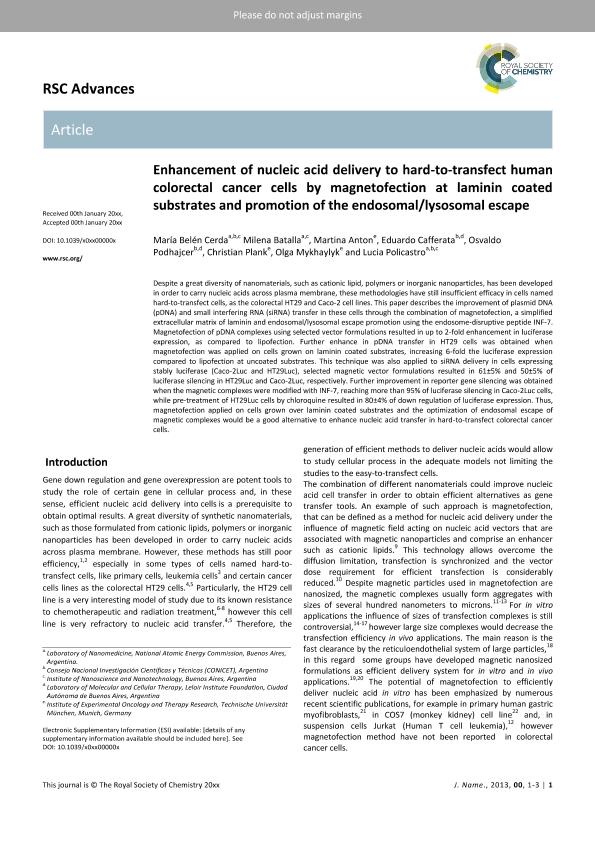Artículo
Enhancement of nucleic acid delivery to hard-to-transfect human colorectal cancer cells by magnetofection at laminin coated substrates and promotion of the endosomal/lysosomal escape
Cerda, Maria Belen ; Batalla, Milena; Anton, Martina; Cafferata, Eduardo Gustavo Alfredo
; Batalla, Milena; Anton, Martina; Cafferata, Eduardo Gustavo Alfredo ; Podhajcer, Osvaldo Luis
; Podhajcer, Osvaldo Luis ; Plank, Christian; Mykhaylyk, Olga; Policastro, Lucia Laura
; Plank, Christian; Mykhaylyk, Olga; Policastro, Lucia Laura
 ; Batalla, Milena; Anton, Martina; Cafferata, Eduardo Gustavo Alfredo
; Batalla, Milena; Anton, Martina; Cafferata, Eduardo Gustavo Alfredo ; Podhajcer, Osvaldo Luis
; Podhajcer, Osvaldo Luis ; Plank, Christian; Mykhaylyk, Olga; Policastro, Lucia Laura
; Plank, Christian; Mykhaylyk, Olga; Policastro, Lucia Laura
Fecha de publicación:
2015
Editorial:
Royal Society of Chemistry
Revista:
RSC Advances
ISSN:
2046-2069
Idioma:
Inglés
Tipo de recurso:
Artículo publicado
Clasificación temática:
Resumen
Despite a great diversity of nanomaterials, such as cationic lipid, polymers or inorganic nanoparticles, has been developed in order to carry nucleic acids across plasma membrane, these methodologies have still insufficient efficacy in cells named hard-to-transfect cells, as the colorectal HT29 and Caco-2 cell lines. This paper describes the improvement of plasmid DNA (pDNA) and small interfering RNA (siRNA) transfer in these cells through the combination of magnetofection, a simplified extracellular matrix of laminin and endosomal/lysosomal escape promotion using the endosome-disruptive peptide INF-7. Magnetofection of pDNA complexes using selected vector formulations resulted in up to 2-fold enhancement in luciferase expression, as compared to lipofection. Further enhance in pDNA transfer in HT29 cells was obtained when magnetofection was applied on cells grown on laminin coated substrates, increasing 6-fold the luciferase expression compared to lipofection at uncoated substrates. This technique was also applied to siRNA delivery in cells expressing stably luciferase (Caco-2Luc and HT29Luc), selected magnetic vector formulations resulted in 61±5% and 50±5% of luciferase silencing in HT29Luc and Caco-2Luc, respectively. Further improvement in reporter gene silencing was obtained when the magnetic complexes were modified with INF-7, reaching more than 95% of luciferase silencing in Caco-2Luc cells, while pre-treatment of HT29Luc cells by chloroquine resulted in 80±4% of down regulation of luciferase expression. Thus, magnetofection applied on cells grown over laminin coated substrates and the optimization of endosomal escape of magnetic complexes would be a good alternative to enhance nucleic acid transfer in hard-to-transfect colorectal cancer cells.
Palabras clave:
Magnetic Nanoparticles
,
Magnetofection
,
Laminin
,
Inf-7
Archivos asociados
Licencia
Identificadores
Colecciones
Articulos(IIBBA)
Articulos de INST.DE INVEST.BIOQUIMICAS DE BS.AS(I)
Articulos de INST.DE INVEST.BIOQUIMICAS DE BS.AS(I)
Citación
Cerda, Maria Belen; Batalla, Milena; Anton, Martina; Cafferata, Eduardo Gustavo Alfredo; Podhajcer, Osvaldo Luis; et al.; Enhancement of nucleic acid delivery to hard-to-transfect human colorectal cancer cells by magnetofection at laminin coated substrates and promotion of the endosomal/lysosomal escape; Royal Society of Chemistry; RSC Advances; 72; 5; 2015; 58345-58354
Compartir



